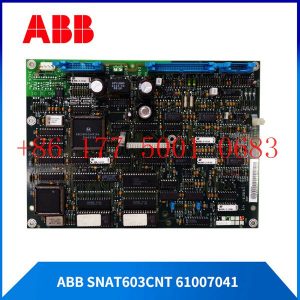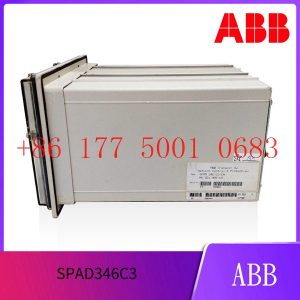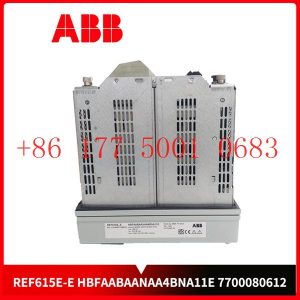Description
When German Chancellor Mucker inserted an index finger into the mechanical tongs at the Hannover
Messe and insisted on personally testing the intelligence of the robot “Corn”, almost all the audience present held their breath and sweated in their hearts.
But his pliers immediately stayed in place, and everyone breathed a sigh of relief.
Since the establishment of ABB China Research Institute in 2005, ABB China R&D personnel have developed the world”s fastest and most accurate six-axis
robot – the “Dragon” IRB 120, and officially launched the world”s first true robot to the market at the Hannover Industrial Fair
in Germany. YuMi (“Corn”), a dual-arm industrial robot that realizes human-machine collaboration.
On the occasion of the tenth anniversary of the establishment of ABB China Research Institute, Mr.
Claes Rytoft, the group”s global chief technology officer, was interviewed by reporters on ABB”s robotics business development and other issues.
Reporter: Is the development of the robot “Corn” targeted at the application needs of specific industries?
Claes Rytoft: Before talking about “corn”, let”s first look at other robots that have been used in industry before.
They are basically industrial arms that do some complex repetitive work. But these robot arms are not safe. They must be placed in a
cage and separated from people at a distance because they are not safe enough.
So let”s look back at “Corn”, he can collaborate with others, he can stand next to you and participate in the work together. In the process of your
human-machine collaboration, if you accidentally touch it with your arm, it will immediately slow down or even stop. This collaborative robot is an innovation in the entire field of robotics.
Let me tell you a tidbit. At the Hannover Industrial Fair in Germany last week, ABB”s robot “Corn” became the
focus, and it was almost one of the most attractive booths at the expo. At that time, German Chancellor Mucker insisted on personally testing the safety and intelligence of ”
Corn”, so he inserted his index finger into the mechanical tongs on “Corn””s arm. At that time, almost all the
spectators present held their breath and were sweating in their hearts, fearing that something would go wrong
and Mucker would be injured. But as soon as Mukeer put his fingers in, his pliers immediately stopped in place, and everyone breathed a sigh of relief.
This example also shows that “Corn” is a true human-machine collaborative robot, and the users it targets are users who need human-machine collaborative work.
“Corn” can be used in many assembly and manufacturing industries. In terms of human-machine collaboration, there is no compromise in the accuracy of its operation, and it can accurately reach an
accuracy of 0.02 mm, which is equivalent to the smallest gap that can be felt by
the human hand. To put it figuratively, you can use “corn” to “thread the needle”.
Reporter: What is the development direction of ABB Robotics in China? What is the driving force for development?
Claes Rytoft: ABB”s robot business first started in the automotive industry. In the era of mass production in the 1950s
and 1960s, robots were used to perform complex and dangerous operations, such as spraying and welding.
Take welding as an example. To ensure that welding meets standards, it must be operated by very skilled technical
workers, and robots can also meet standards after being programmed. This is why the first robot was born at ABB”s Swedish research institute and was quickly promoted to worldwide.
There is always room for development in this industry, and saturation is relative. China has now become a production
base for electronic consumer products, and most of the production factories still rely on manual labor. Therefore, when ABB established a robot R&D and manufacturing base
in Shanghai in 2005, it began to study which manufacturing industries robots should serve, and finally believed that
it could replace Labor in these factories is also a new development direction. This depends more on the Chinese team.
In 2009, Dr. Gu Chunyuan, chairman and president of ABB (China) Co., Ltd., led a local team to successfully develop the IRB 120 robot
, which is specifically designed for small parts assembly in the automotive industry.
As for the driving force of development, it is cost. In 2005, Dr. Gu Chunyuan went to a labor-intensive equipment company
in China for research. At that time, he imagined that if the robot designed by ABB could complete all the operations of human hands on this production line,
it would be able to relieve these young people from these heavy and intensive tasks. Freed from extremely
boring and highly repetitive labor to do other things. This is why ABB Robotics has determined such a development direction in China.
Excitation system ABB module INIIT13
Excitation system ABB module INIIT13
Excitation system ABB module INIIT12
Excitation system ABB module INIIT03
Excitation system ABB module INIIT03
Excitation system ABB module INIIT02
Excitation system ABB module INIIT01
Excitation system ABB module INIET800
Excitation system ABB module INICT13A
Excitation system ABB module INICT13A
Excitation system ABB module INICT13
Excitation system ABB module INICT12
Excitation system ABB module INICT03A
Excitation system ABB module INICT03A
Excitation system ABB module INICT03
Excitation system ABB module INICT03
Excitation system ABB module INICT01
Excitation system ABB module INICT01
Excitation system ABB module INICT01
Excitation system ABB module INICT01
Excitation system ABB module INFBA01
Excitation system ABB module INFBA01
Excitation system ABB module INDDM01
Excitation system ABB module INDDM01
Excitation system ABB module INBTM01
Excitation system ABB module INBTM01
Excitation system ABB module INBIM02
Excitation system ABB module INBIM02
Excitation system ABB module IMUSM01
Excitation system ABB module IMUSM01
Excitation system ABB module IMTSA01
Excitation system ABB module IMTSA01
Excitation system ABB module IMSPM01
Excitation system ABB module IMSPM01
Excitation system ABB module IMSET01
Excitation system ABB module IMSET01
Excitation system ABB module IMSET01
Excitation system ABB module IMSET01
Excitation system ABB module IMSER02
Excitation system ABB module IMSER02
Excitation system ABB module IMSED01
Excitation system ABB module IMSED01
Excitation system ABB module IMSED01
Excitation system ABB module IMSED01
Excitation system ABB module IMRIO02
Excitation system ABB module IMRIO02
Excitation system ABB module IMRIO02
Excitation system ABB module IMRI002
Excitation system ABB module IMRDO01
Excitation system ABB module IMRDO01
Excitation system ABB module IMRDI13
Excitation system ABB module IMRDI13
Excitation system ABB module IMRDI01
Excitation system ABB module IMRDI01
Excitation system ABB module IMRCC02
Excitation system ABB module IMRCC02
Excitation system ABB module IMRAO02
Excitation system ABB module IMRAO02
Excitation system ABB module IMRAI12









Reviews
There are no reviews yet.